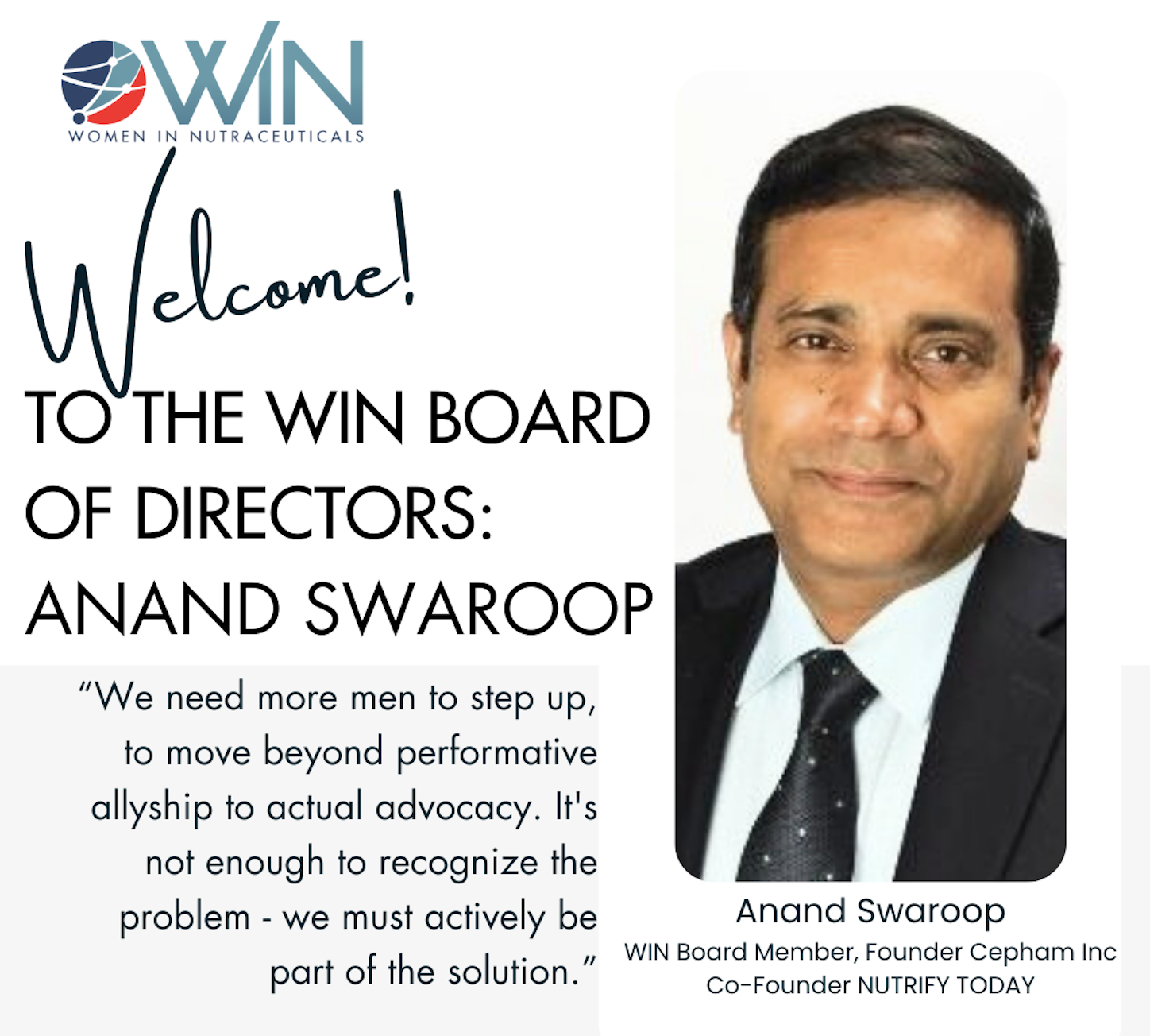Meet Women In Nutraceuticals Board Member: Anand Swaroop
It is our honor to introduce one of Women In Nutraceuticals most recent additions to the board of directors, Anand Swaroop, Ph.D., who exemplifies a unique journey from a trained scientist to a pioneering entrepreneur in the nutraceutical and natural products sectors. With a foundational academic background in Biochemistry from the University of Allahabad, Dr. Swaroop has dedicated over two decades to advancing innovative solutions for health and wellness.
As the founder of several enterprises—Cepham Inc., Cepham Life Sciences, and co-founder of Nutrify Today, to name a few—Dr. Swaroop has consistently bridged scientific rigor with entrepreneurial vision. His ventures span a global network of manufacturing and research facilities, contributing to advancements in herbal extracts, phytochemicals, diagnostic products, and sustainable food additives. Beyond business, his role on India’s nutraceutical task force and his numerous publications reflect his commitment to shaping responsible, science-backed nutrition worldwide. His focus on product safety, science, and sustainability not only guides his investments but also defines his approach to creating a lasting impact in the natural products industry.
We sat down with Dr. Swaroop to learn more about what fueled his passion for nutraceuticals, business, science and research.
From Indian Roots to WIN Boardroom: A Conversation with Anand Swaroop
"Growing up in the 1980s, India was like living in two worlds," Anand Swaroop said, leaning back in his chair, a thoughtful smile crossing his face. "In our home, we had these incredible stories of powerful goddesses – Durga, Lakshmi, Saraswati. Every morning, I'd watch my mother perform puja, praying to these fierce female deities who embodied strength, wisdom, and power. But step outside, and it was a different story entirely."
The Paradox of Home
In the 1980s, India of Anand's youth was a country in transformation. Traditional values collided with modernization as India's tech boom began taking root. "It was fascinating," he says. "You'd see women entering technical fields, becoming pharmacists, scientists, and engineers, but still facing expectations to be traditional homemakers. My mother embodied this complexity."
He pauses, clearly moved by the memory. "Here was this brilliant woman who, despite the constraints of 1960s India, pursued not just her bachelor's and master's degrees but also started work on a PhD. She'd stolen time to read, to learn. When I asked her why, she said something I'll never forget: 'Learning helps create a better world, beta (son), and makes me a better parent.'"
American Dreams and Reality Checks
When Anand moved to America, it wasn't just for professional opportunities. "I had this idealistic vision of America as the land of equality," he chuckles. The reality proved more complex. "What hit me was that gender inequity isn't a geographical issue - it's a global and human one. The same patterns I saw in India were here, too, just in a different context. In boardrooms instead of family gatherings, in corporate policies instead of social customs."
The Business of Change
This realization coincided with his growing understanding of the nutraceutical industry's dynamics. "Here's what surprises me most," he leans forward, suddenly animated. "65% of farmers and post-harvest processors in our supply chain are women. Women make most health decisions for their families. Yet when I looked at industry leadership..." he spreads his hands, letting the silence speak volumes.
Data and Dharma
"In Indian philosophy, we have this concept of dharma - duty, righteousness. For me, pushing for gender equity isn't just about business metrics, though those support it. It's about dharma."
But Anand is also a scientist at heart. "Look," he says, pulling out his phone to show a spreadsheet, "when I talk to skeptical executives, I don't start with philosophy. I show them the numbers. Diverse teams outperform homogeneous ones. Companies with gender-balanced leadership show better returns. It isn't charity - it's smart business."
The Next Generation
His voice softens when talking about his daughter, a PhD in neuroscience. "When I think about her future... you know, we're all temporary custodians of this industry. The question isn't just what opportunities we're creating and what barriers we're breaking down."
Learning to Listen
"My biggest learning? Sometimes, men need to keep quiet and listen," he laughs. "In India, we have this saying: 'When the student is ready, the teacher appears.' WIN has been my teacher in many ways. These women leaders - they're not seeking favors. They're asking for equal access to merit-based opportunities that many of us men take for granted."
Making Music
Music has been Anand's constant companion through this journey. His dream playlist for the next WIN event reflects both his roots and his aspirations for change: from Aretha Franklin's "Respect" to traditional Indian classical, from Bob Marley's "One Love" to Alicia Keys' "Girl on Fire." "Music reminds us that change is possible," he says. "Every great movement had its soundtrack. Why should gender equity be any different?"
The Road Ahead
Anand's vision is evident as he settles into his WIN board role. "We need more men to step up, to move beyond performative allyship to actual advocacy. It's not enough to recognize the problem - we must actively be part of the solution."
"Let me share something that bothers me," Anand leans forward, his tone becoming more serious. "I often see talented women executives being treated in one of two problematic ways: either they're viewed through a lens of gender-based assumptions, or there's this overcautious tiptoeing around them that's equally counterproductive."
He smiles again, that same thoughtful smile from the beginning of our conversation. "You know, those goddess stories from my childhood? They weren't just myths. They were blueprints for a world where power isn't gendered, where strength comes in all forms. That's the world I want to help build."
Contributor: Kim Decker

